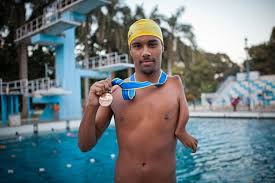For decades, the name PT Usha stood as a symbol of India’s greatest individual medal haul in a multi-discipline sporting event. But in the autumn of 2014, a swimmer born with a deformed left hand quietly eclipsed that record—and in doing so, transformed the conversation around disability and sports in India.
Sharath Gayakwad, a 23-year-old from Bengaluru, emerged as the unexpected star of the 2014 Asian Para Games in Incheon, South Korea, securing six medals across various swimming events — one silver and five bronze. In the process, he became the first Indian athlete to surpass PT Usha’s iconic four-medal haul from the 1986 Seoul Asian Games.
But Sharath’s triumph went beyond numbers.
Born with a limb abnormality, Gayakwad had initially struggled to fit into mainstream physical education classes. It was a perceptive school coach who encouraged him to take up swimming—not as therapy, but as potential. That early spark, combined with years of training under coach John Christopher, led Sharath to national and then international platforms.
“I didn’t set out to break records,” Gayakwad said after returning from Incheon. “I only wanted to show what’s possible when belief is stronger than limitation.”
His victories came in multiple categories—freestyle, breaststroke, backstroke, and individual medley—demonstrating not just excellence but adaptability. Each race was a step toward not only personal redemption but also a larger statement: that India’s differently-abled athletes deserve both visibility and recognition.
Sharath’s feat arrived at a time when India was still grappling with how to integrate and support para-athletes. While infrastructure and awareness remained limited, his performance turned national attention toward a long-overlooked segment of Indian sports.
“I don’t think of it as breaking PT Usha’s record,” he said modestly. “She inspired generations. I only hope someone sees my story and dares to dream beyond what others expect of them.”
In the years since, Gayakwad has continued to mentor young swimmers and advocate for inclusive sports infrastructure. But to many, his legacy was sealed in Incheon—with each medal, a stroke against stigma, and a quiet rewriting of history.


